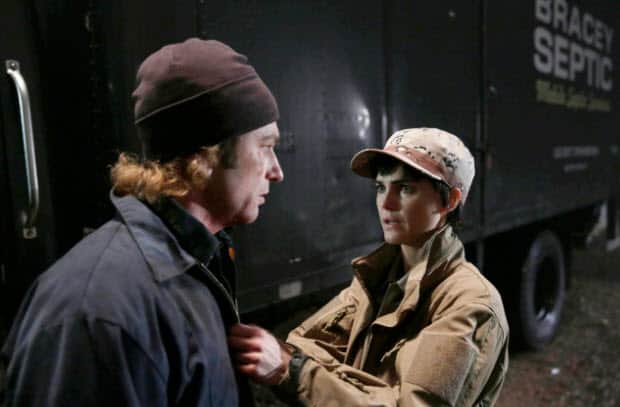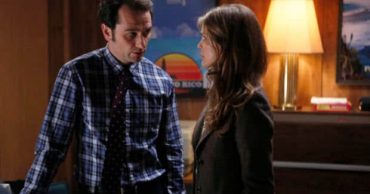
It was just last week that I was explaining how I have been having trouble connecting with The Americans on an emotional level. While I have never felt like the series has been purposefully boxing me out of some of the characters and their feelings, I am simply more aware of the camera being its own entity in The Americans. Or, I was. Either “Martial Eagle” is an episode that is particularly good at showing what is going on in certain characters’ heads (mainly Philip; and this may be the case) or else I still have some learning to do about figuring out the best way to watch this series (and this may be the case, too; I made a conscious effort to pay more attention to character beats than plot information while watching this one). Whatever the case is, “Martial Eagle” does an exceptional job of taking one of its main characters to breaking point by showing how truly awful this kind of cold war can be.
The focus on Philip is actually really welcome, since the scale of material has tipped slightly in favor of Elizabeth this season. And while the journey that Philip goes through in “Martial Eagle” is completely different from the horrible aftermath of the sex scene between Clark and Elizabeth a few weeks ago and how that affected Elizabeth, this is just as powerful in some ways. We know that Philip has always had his issues with his job. The appeal of the American life draws him in–never to the point of turning but far enough that his dreams revolve around a reality in which he could just live with his family without having to do missions for the motherland anymore. So, when Philip is forced to kill, the weight of that pointlessness is heaviest. When going after the Arpanet, Philip chastised his partner for getting him into a situation in which an innocent person had to die. Similarly, Philip puts himself through endless psychological pain by considering what he’s done in killing three people on the military base he and Elizabeth infiltrate at the beginning of the episode–or four, if you want to count the man who dies tied up to the tree (and as a long side note, I am a sucker for the finer details of the editing process, so I really appreciate when the names of people involved with the show take a break during the action so that there isn’t anything distracting the viewer in the frame. For all its faults overall, Sons of Anarchy, another FX series, does this kind of thing incredibly well, sometimes postponing the name of the episode’s director until after the 15-minute mark).
Once Philip is faced with the reality of all this, he can’t help but lash out at everyone around him who doesn’t understand what he’s going through. Paige gets an earful, including seeing her father tear out pages from her youth bible before throwing it across the room, to the surprise of Elizabeth, even. The attitude is contagious, and we see how Elizabeth embodies it several times in “Martial Eagle.” But not only is forcing Paige to clean the kitchen a product of that pain-by-proxy, it also comes from a place inside Elizabeth in which she wishes she could be there for Philip in the same way he was there for her. The Americans can’t just let that idea be simple, though, and this is actually one of the aspects of “Martial Eagle” that is hardest to deal with. Elizabeth has a chat with an AA member, in which she reveals this information about wanting to show Philip that she understands what he’s going through, even though I really do think it is easier for Elizabeth to be doing what they do (easier, but not easy, I should say). And when I saw Elizabeth in the AA meeting to begin with, I thought it was a parallel scene to Philip’s on the pier–a place where a character can just escape. However, we quickly learn that Elizabeth is there on business, making the admittance slightly less impacting because of the air of dishonesty permeating the whole scene (and as another side note, I believe the company mentioned in the episode is Northrop–now Northrop Grumman; I could be wrong about that, but if I’m not, it’s an entertaining coincidence that I know a few people who work there).
The same thing happens with Philip, and it’s where issues of “protagonist” and “sympathy” become tricky. They are tricky to begin with, given that The Americans chooses anti-national characters to be its central ones for an American audience. But, for the most part, Philip and Elizabeth have built up plenty of sympathy over the course of 20+ episodes. And when much of “Martial Eagle” devotes energy to showing how horrifying of a situation Philip is in, that sympathy should only built. Philip’s scene as Clark, however, immediately removes all of that. When he sees Martha and uses everything to his benefit, manipulating her by breaking any defenses she has and building them back up in his own way, he’s as despicable as anyone on this show has ever been. And I don’t know how I feel about that. On the one hand, this is who he is and who he always has been, so it’s not a surprise to see him do this. On the other hand, it’s hard to convince viewers to buy into the plights of this man who has such a profound reverence for human life when he also has such a total disregard for Martha’s metal well-being. It makes relating to these characters just a little more difficult, which goes back to my original point about emotional connection. So, even though I watched “Martial Eagle” capable of getting into the hearts and minds of the characters in The Americans better than I have all season, that doesn’t necessarily mean that the distance is bridged. There are still issues keeping viewers at arm’s length, I would argue. And that seems to be the point. Though, that begins to make me wonder: why?
Other Thoughts:
– I normally don’t do these kinds of sections in my reviews, but so much of “Martial Eagle” is about what Philip is going through that I didn’t want to have an extra paragraph at the end detailing the other things going on, so here are some bullet points instead!
– Sandra is with another man. No surprise there. Stan didn’t even notice what was happening. No surprise there. Stan has a very small breakdown/crying session after she leaves. Somewhat of a surprise there? I don’t think Stan harbors any legitimate feelings for Sandra anymore, but I could see how this might be lamenting the end of a thing or an era for Stan.
– No Nina or Oleg this week, which might usually be something to be angry about, but the episode handled the other characters so well that the omissions weren’t too glaring.
– Even though his character is light years away from the action, it’s great seeing Lee Tergesen back in this episode. He’s been a small but great addition to the season so far.
– Poor Henry. Either people don’t want to see his magic tricks or else they see right through them immediately.
[Photo via Patrick Harbron/FX]
 Follow Us
Follow Us





